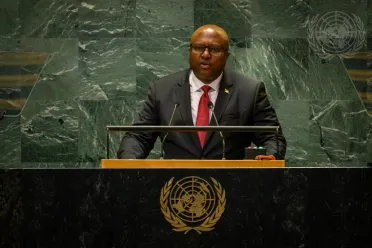Statement
Statement summary
ALBERT SHINGIRO, Minister of Foreign Affairs and Development Cooperation of Burundi, said that now, more than ever, countries act unilaterally, as if others do not count. “Solidarity has become a rare commodity at the moment we need it the most” he said, pointing out that all conflicts arise when others are denied their interests and there is a loss of trust through “geopolitical jostling and deliberate misinformation” polarizing countries and paralysing societies. “We condemn all those who attach political conditions to development aid while at the same time forgetting that the world is multipolar,” he said. Diversity is a mine of richness, he said, providing tools to accept the other, increasing a society’s potential to prosper, he stressed, adding that cultural diversity brings people together. However, the past 20 years have seen an instrumentalization of cultural values to sow division as they have been “placed on the front line of conflicts and used as a tool of division” and used to subjugate weakened societies.
Lamenting a fading spirit of compromise, he noted that every country has a role to play in addressing the challenges of our time. Meanwhile, unilateral measures destroy the social fabric of countries they are imposed upon. Worse, the promises of the 2030 Agenda for Sustainable Development fall further out of reach, he said, calling on the international community to redouble efforts to meet existing needs, especially those of small island developing, least developed and landlocked developing countries to “leave no one behind”. Noting that Burundi is working to improve its quality of life, he said that the only path towards true independence requires economic independence. To that end, the Government has unveiled a plan to put the country on track to be a developed country by 2060. Through structural changes and a raft of other development plans, Burundi will be a country of peace with a competitive economy through mining and agriculture, in respect not only of its natural environment but also gender equity. “Peace without development is a mere pipe dream” he said.
Addressing terrorism in the region, he reaffirmed his country’s commitment to cooperating with partners, namely Somalia, the Central African Republic and the Democratic Republic of the Congo, to re-establish peace in the region. Burundi is increasingly affected by climate-related disasters despite its minimal contributions to greenhouse gases. Landslides, droughts, and the rising level of Lake Tanganyika cause food insecurity and the erosion of local ecosystems. Calling for increased climate financing to combat these disasters, he highlighted measures adopted as part of its climate change mitigation plans, including reforestation efforts — the “covered Burundi” initiative. Generally, human rights must respond to universality, non-selectivity and the rejection of double standards. In that vein, he called for the end of the so-called Special Rapporteur on Burundi’s mandate, a politically motivated project which creates tensions in the country. Finally, addressing the need for Security Council reform, he lamented that “unprecedented injustice is being done to Africa” and cannot continue. “The desire to perpetuate the exclusion of 1.2 billion inhabitants” from the table where some of the most important decisions are made is unacceptable, he said.
Full statement
Read the full statement, in PDF format.
Photo

Previous sessions
Access the statements from previous sessions.
